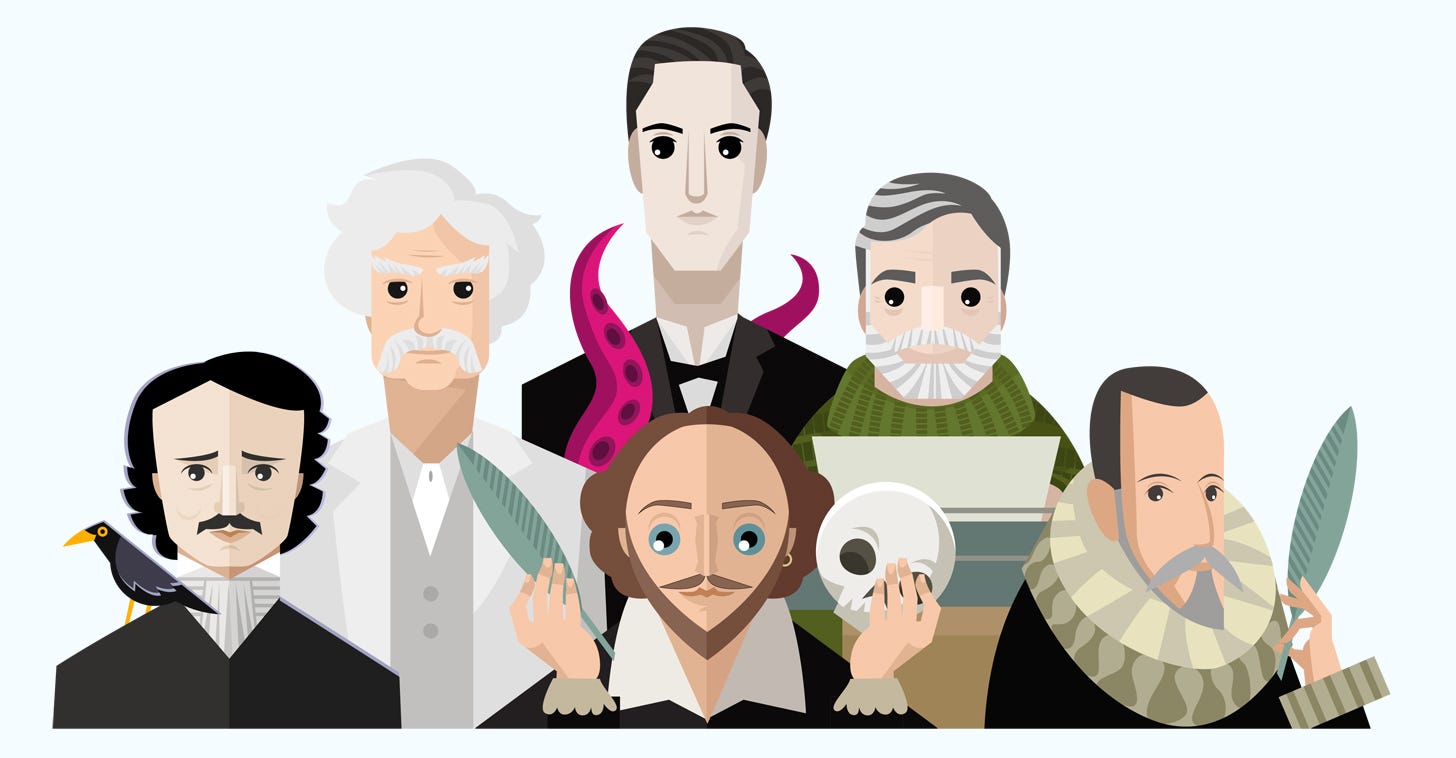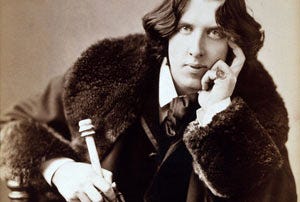✍️ In GOAT Wars, Every Writer Loses
or, Why All Comparisons Are Not Just Useless But Dangerously Discouraging
Do you compare yourself to other writers even before you sit down to write? How’s that working out for you?
If you’re like most writers, it probably doesn’t end well. You get in your head and focus more on what they wrote instead of the blank page in front of you. Worse, you start comparing your writing to theirs – even though you haven’t even written a word yet. It’s another one of those true-but-irrational quirks of being a writer.
Consider this:
“Art is beautiful because it’s unique to the artist,” said writing coach and YouTuber Abbie Emmons. “You have something that no one else has.” (See video below.)
I’d build on that to say that we all have at least two things that nobody else has: our own style and our own perspective. We all have different experiences that we bring to our pens. We all process those experiences in different ways. We all react to experiences differently, have different belief systems about what’s important (e.g. “truth” vs. “loyalty”), and have unique insights. We also have different ways of “painting the picture”.
Take the images below, for example:
As you see, one photograph can be presented in several different ways. All are roughly the same image. But each representation – including the original photo – is unique.
The same is true for writing. Asking 100 writers to write about the same topic, no matter how narrow, will still bring incredibly varied results (unless those writers are all AI…). I’ve seen proof of this in action, and perhaps you have, too. If you read entries to a themed story contest, you get completely different stories despite the singular topic.
But here’s the really interesting thing: no one story is necessarily better than another. Sure, one of them wins. However, as contest judges will tell you, choosing a winner is highly subjective. Which version of the image above is better? Vote here and let’s see – I’m betting most get at least one vote. Similarly, many of those stories will get a vote for “best”, too.
Who’s the GOAT Writer?
In other words, there isn’t a “best”; there is only a “favourite” for each person – and what makes it a favourite is highly subjective.
Let’s look at this from the literature perspective. Who is the greatest-of-all-time (GOAT) writer? Margaret Atwood? William Shakespeare? Dan Brown? Stephen King? Al Purdy? William S. Burroughs? Walter Cronkite? E.L. James? All have fans who will say he or she is “the best”. Choosing between one writer or one piece of writing is so subjective, so personal, and so rooted in perspectives that all comparisons are useless. Besides, being a writer isn’t a competition. That’s true even when you enter a writing contest. It’s your piece that’s being judged, not you the writer.
Sometimes the comparisons aren’t even fair. Cronkite wrote news, Atwood writes novels, Shakespeare wrote plays… four hundred years ago. Talk about comparing apples to fruit baskets!
Even if you’re not an Atwood-level writer (and who among us is), you’re going to have your followers. For many of you reading this, the answer for GOAT writer is “none of the above” – yours might even be a writer that the rest of us have never heard of.
Bottom line: there is room on the bookshelf for all of us.
Don’t Give in to the Dark Side
None of this would matter if it was purely academic. But there is a dark side to comparisons. As soon as we start down that road, we start feeding other fears including imposter syndrome, fear of the blank page, and distractions.
Don’t give in to the Dark Side!
Yeah, I know. Easier said than done. Here are some ideas you can click into your current mindset to help fight off the doldrums:
Keep in mind that writing about the same topic, no matter how narrow, will still bring incredibly varied results. Stories or poems submitted to themed contests are one example. What will your entry look like?
Perspective is hugely important to a piece of writing – and not even Atwood can write from your viewpoint. Consider what is really important to you and focus on that in your writing to ensure a fresh perspective – and therefore fresh and interesting writing.
Stop worrying about what other people are going to think, just for the moment. Yes, you always want to keep the reader in mind. But that means telling the reader the story in a clear and interesting way. It doesn’t mean hanging off every word to see their reactions. Please yourself first.
Don’t think. Write. (Yes, this does seem to be my answer for everything, doesn’t it?)
Comparisons are Useless, but Inspiration is Not
All comparisons are useless, but that doesn’t mean you can’t be inspired by your favourite authors. Hunter S. Thompson famously typed out The Great Gatsby because he admired the book so much and wanted to learn how to write a novel.
You can also read a beautiful passage and say, “I wish I wrote that!” Totally okay – as long as it’s not debilitating.
Good: Say “I wish I wrote that!” and then go and write your own beautiful passage.
Bad: Say “I wish I wrote that!” and then go and watch Prime Video for 10 years because you didn’t write that one passage.
Speaking of getting discouraged, what’s the opposite emotion? Excited? Optimistic? Confident?
No. The opposite of discouraged is courage. We’ve all heard at some point that writing takes courage. It sounds dramatic and hyperbolic. Except that it’s not. The next time you feel discouraged, realize that that’s the moment the courage kicks in. Don’t let comparisons beat you. Stand up to the Dark Side and realize that what we’re talking about here is writers getting in their own way. Step aside. Sit down. Write. Let the rest worry about itself.
It’s a fine line. Sometimes, it’s hard not to give in to the Dark Side. But you can do it. All it takes is one thing: to sit down and write (with wild abandon).
Key Takeaway: All comparisons are useless. If you agree that no one can definitively say Writer A is better than Writer B, then what someone else wrote does not matter one iota to what you’re writing. You offer a unique style and perspective that nobody can match. Summon the courage to go out and write your own best you, and let the rest sort itself out. There is room on the bookshelf for all of us.
Over to You: How Do You Avoid Discouragement?
What do you do to avoid the discouragement that comes with comparing yourself to other writers? Do you do anything? If not, will you now? Let us know in the comments below. In the meantime, I leave you with a short video from Abbie Emmons below about not comparing yourself with other writers.
Until next time, keep writing with wild abandon!
~Graham
email me if you get lost.








I'm relatively at the start of my writing journey, so it is easier for me to compare my writing with myself from earlier. Am I writing better than 2 years ago me? If the answer is yes, I feel good. If the answer is no, I have the advantage of analysing my own writing, putting myself in the same mindspace, trying to conjure up the same point of view, and rewriting. If I can, I usually end up writing something better. If I can't, I still publish anyway haha!
Wow - well said! This can be applied to everything we try to do in life. We have to learn to stop comparing ourselves to others - and thinking that another person's way, style, method, etc. is the only way to be a great writer, painter, teacher, chef, etc. Learn from others, create your own style, continue learning, and it will all fall into place. Thanks, Graham!